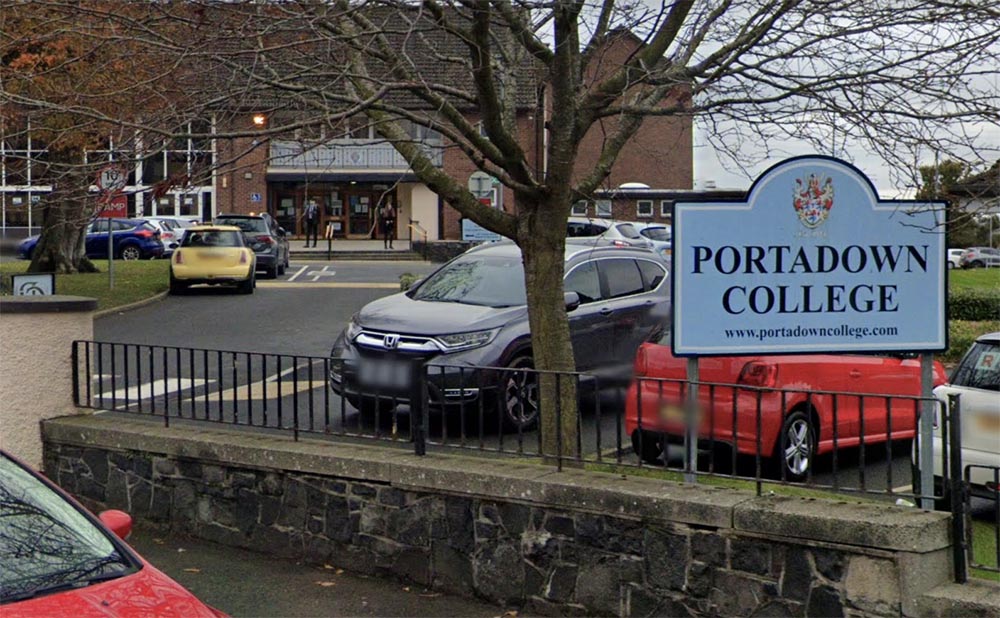
The mother of a child attending Portadown College has spoken of what she deems to be a “complete failure” of the school in supporting her daughter through her GCSE exams.
The mother – who wishes to remain anonymous – contacted Armagh I after her daughter, who suffers with severe TICS associated with Tourette’s Syndrome, returned home from her history exam in an “absolute state”.
The 16-year-old began developing symptoms of Tourette’s four years ago after suffering a severe trauma. She now struggles with unpredictable physical outbursts – which are hugely exacerbated by stress – where she can spend periods of time relentlessly shaking her head vigorously, cracking her neck, twitching, punching out and – most severely – banging her head on tables.
Her mother explained that the school had been provided with all medical evidence and need for “special circumstances” when her daughter first enrolled with Portadown College in 4th year (2022).
However, she states that the school have “never once” reached out or indicated that any further information was necessary to allow access arrangements or adjustments to be made prior to her GCSE exams.
She said: “Perhaps it was just a naïve assumption on our behalf that relevant adjustments would be made in relation to her condition; that she would get extra time or her own room, but I had no idea that she would be put into the main hall with the rest of the children to sit her GCSE exams.
“I lifted her at the school and when she got into the car she just burst into tears, citing the horror of what happened and the humiliation she felt. She was just a mess. She was just devastated.
“She had to be kept off school for a week prior to actual study leave due to her TICS being so severe and having had huge black bags under her eyes. She said, ‘I’ve ticked the whole way through the exam for an hour and 45 minutes to the extent I’ve been banging my head off the table. It was terrible. I wasn’t able to finish my paper because of it’.”
Angered and upset, the mother said she rang the school and asked for clarification.
However, she added: “No-one would speak to me on the phone. I had to email even though I had previously emailed after the first exam when I realised that she hadn’t been given fair or equal treatment to that of another pupil who has the same condition.
“I then rang as no one had responded and I eventually got a reply three days later at 5.07pm, the night before her next exam, to say nothing would be done.”
Since then, the family say they have attended an emergency meeting with the school to discuss options and provided the school with consultants’ and doctors’ reports the mother says outline the steps needed to facilitate her condition.
However, with just four hours until her daughter was due to sit her next exam, the school said they wouldn’t be making any adjustments to support her and they needed to assess all medical evidence.
“They have said that they needed to know all of this prior to the exam starting, but I believe that they did know – we provided the evidence. And, even then, surely there is some sort of emergency protocol for something like this where we can make arrangements now that she is struggling.
“I have been advised by special educational needs co-ordinators (SENCOs) that there doesn’t need to be a medical diagnosis for a plan to be put in place and that the school can put forward for this at the school’s discretion. They have a duty of care to her.
“We have been promised support at numerous meetings but nothing has ever happened.”
In an attempt to get her daughter additional support, the woman has contacted her paediatric consultant, her doctor, Upper Bann DUP MLA Diane Dodds, Mayor Margaret Tinsley and MP Carla Lockhart for help – all of whom she says have been very supportive.
She continued: “My daughter has been through so much in her life and I am so proud of her. She could easily bury her head and say she’s not going into school but she doesn’t want to do that. She should be praised for her hard work and determination and that should make the school want to support her all the more.”
It should be noted, however, that the school are legally bound by exam awarding body JCQ regulations, which stipulates that a student is not automatically entitled to access arrangements on the sole basis of having a diagnosis.
As outlined in the Post Primary Access Arrangements Information for Teachers, Parents and Guardians: “The evidence of need required by JCQ, is based on teachers’ observations, evidence must be collated by the SENCo before the school applies to JCQ for access arrangements. The SENCo stores the evidence gathered for each pupil and is required to produce this evidence for the JCQ Inspector.
“JCQ annually publishes regulations and guidance relating to access arrangements. All schools and colleges are bound by JCQ and their stipulations must be adhered to.
“JCQ regulations state that schools must be able to demonstrate a history of need and consistent use of reasonable adjustments to support formal applications.”
A spokesperson for Portadown College said: “The college is unable to comment on matters relating to individual students within the school.
“We continue to follow policies and procedures as appropriate in the interests of all of our young people.”



